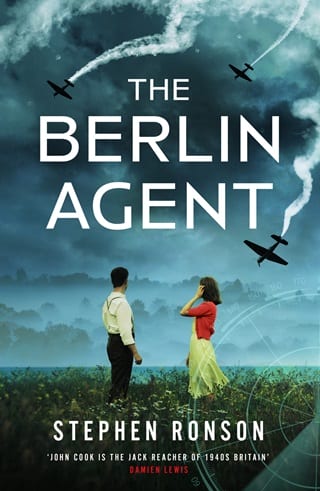34
The train was full. All eight seats were taken in our compartment, the luggage racks were bulging, and several cases filled the space between the two rows where ordinarily our legs would have fitted. I kept my legs pressed awkwardly against the window, the metal sill digging into my knees as I watched the countryside rush by. Margaret sat across from me, with her own view out the window.
We’d taken the train up from Uckfield to Victoria, made our way on foot to Waterloo to catch the train for the west country. London was eerily quiet. As we’d hurried across Southwark Bridge, we’d stopped and listened.
‘I wonder what it’s like in Paris this morning,’ Margaret said. Only two hundred miles away, Nazi tanks were rolling along ancient boulevards. German officers were sitting at tables outside coffee shops, toasting their victory. Did it feel real to them? Or were they, too, marvelling at the oddity of being in an ancient foe’s capital city, emptied of most of its residents, taken with barely a shot fired.
It took the train forever to get clear of London, with its interminable suburban stops, but now we were making good time, rushing west, out of harm’s way. The atmosphere in the compartment had been tense in the city, always the fear of what was to come. Now, everyone -relaxed. Newspapers were rustled, sandwiches unwrapped, legs recrossed.
We were going to pay a visit to Doc’s old patient, who’d left the Forest in a hurry a few months ago. Mr Gooch had sat as a magistrate for a long and distinguished career. I wanted to hear why he’d left. A last-gasp effort to put some kind of logic to the mess I’d put in motion when I inserted myself into whatever had been going on. I owed the Leckies that much, at least. I also wanted to ask him which of his former neighbours on the Forest would be most likely to harbour a German parachutist. A man like Gooch would have made it his business to know the people around him. What kind of people they were.
There was a discarded copy of yesterday’s Evening Standard wedged between the seat and the armrest. I picked it out and flicked through it. I read a shrill opinion piece, telling us to watch out for fifth columnists – people who sympathised with the Germans and were planning to defeat us from within. The phrase was the current darling of the press. It had come from the war in Spain. General Vidal had encircled Madrid with four columns of infantry and artillery. He referred to his supporters inside the city as his fifth column. Civilian agitators who could make a nuisance of themselves and undermine the loyalist -government.
I didn’t set too much stock in what the papers wrote. They were trying to increase their circulation numbers. But the idea held a certain logic. Not everyone in the country wanted war. Some people actually supported Hitler’s politics, especially when he talked about the Jews and Communists. I thought about the poster in the urinal.
Say no to a Jews’ war.
*
The train deposited us at Greenway, and we took the chain ferry across the river to Dittisham, then walked up a steep hill that left both Margaret and me pretending not to be out of breath.
‘How well do you know these people?’ Margaret asked.
‘I don’t,’ I said.
I looked further up the road. We still had a good stretch of hill to climb. I stopped and took in the view. Dittisham lay below us, the river Dart snaking into the distance, to where the sea glittered in a haze of misty afternoon light.
‘Doc said Gooch was a good man. Not likely to be scared off by the prospect of a few bombs, or even the invasion. No nonsense. He said he thought it was curious when he said he was leaving.’
‘So we walk up to his door and ask him to explain himself?’
She looked at me carefully.
‘Do you want to sit down?’
‘Wanted to take in the view.’
‘Might want to cut down on the sausages,’ she said, with a glint in her eye.
 Fullepub
Fullepub 



